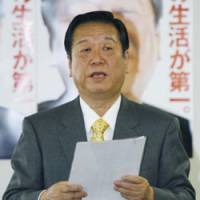The Democratic Party of Japan proposed an economic stimulus package Wednesday that would feature ¥21 trillion in spending over the next two years to help the nation weather its worst postwar recession.
The main goal of the package would be to increase disposable income, DPJ President Ichiro Ozawa said at a meeting of the leading opposition party's shadow Cabinet.
"If the people become more affluent, the economy will recover," Ozawa said.
The DPJ plans to spend ¥14.1 trillion to do this by offering families a ¥26,000 monthly child-rearing allowance, abolishing enrollment fees for public high schools, which could save some families around ¥500,000 a year, creating more university scholarships, and eliminating expressway tolls.
Masayuki Naoshima, head of the DPJ's policy research committee, said the package is designed to increase disposable income at households making ¥3 million to ¥4 million a year by 20 percent.
Other proposals include slashing taxes to 11 percent from 18 percent for small and midsize businesses, offering training to the jobless, and subsidizing household solar energy systems.
The DPJ has been preoccupied with the political donations scandal triggered by the arrest of Ozawa's chief secretary. Critics say the distraction has blunted the DPJ's quest to wrest power from the ruling bloc in the Diet in the general election expected by fall.
Last week, DPJ Secretary General Yukio Hatoyama dismissed such allegations but he also said he felt the need to compile the stimulus package before the government and ruling bloc unveil their latest stimulus plan Friday.
Naoshima, however, admitted the government would have to issue more bonds.

















With your current subscription plan you can comment on stories. However, before writing your first comment, please create a display name in the Profile section of your subscriber account page.